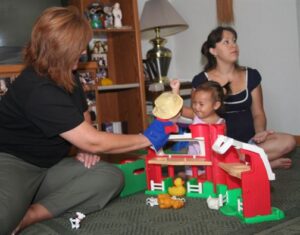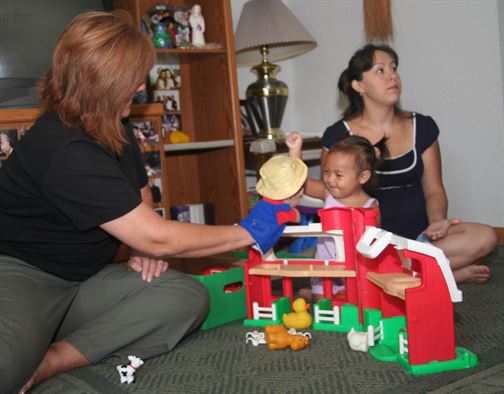This week, Bellwether staff share their perspectives on family and parent engagement. Follow Ahead of the Heard from now until Friday for a series of blog posts that tackle common misconceptions about engaged parents, working with multilingual families, and more. Click here to read other posts in the series thus far.
Let’s be honest: parent engagement is both an imprecise and confounding term. In theory it’s hard to argue against engaging parents in their child’s education. Yet, a couple of years ago, two sociology professors attempted to do so, claiming that parent involvement in education does not improve — and may actually hinder — student achievement. Their research methods were widely criticized and debunked, but the discussion that ensued raised questions about the underlying science regarding parent engagement. In general, few policymakers or practitioners can easily outline what effective parent engagement actually entails. Thankfully in recent years, a clearer answer has emerged in the field of early childhood education.

There is a long history of including parent engagement in early childhood education. In fact, parent engagement has been a fundamental aspect of Head Start — the only federal pre-k program — since the program’s inception in 1965. Head Start was founded on the principle that child development is the product of multiple levels of interaction, with both parents and teachers playing important roles. Based on this history, parent engagement has long been stressed as an important component of early childhood education.
On top of this foundational commitment to family engagement, the early childhood education space also benefits from an emerging body of research that shows that positively changing parents’ behaviors and expectations can directly improve children’s initial and long term academic performance, and that parent engagement is central to promoting children’s school readiness and social-emotional development. A 2017 Robert Wood Johnson Foundation brief outlined four types of parent engagement programs that have been tested using randomized-controlled trials and which were found to positively improve outcomes for low-income preschool aged children. Effective programs typically had at least one of these characteristics:
1.) Promote Positive Parenting Practices and Parent-Child Relationships
The first category of effective approaches to preschool parent engagement includes programs that target specific parenting skills. Examples of such programs include the Incredible Years Parent Training Program, Chicago Parent Program, Dare to by You, and ParentCorps. These programs include tailored lessons aimed at parents which emphasize parenting skills — such as routines, encouragement, and limit setting — known to promote children’s social and emotional development and reduce behavior problems. Each of these programs have been evaluated using rigorous methods and have been found to provide benefits for participating parents and their children.
2.) Promote Home Learning Activities
Programs in this category help parents learn how to engage in developmentally appropriate learning activities . These programs provide parents with home learning materials, coach parents how to use the materials effectively, and provide parents with opportunities to practice their new skills. These programs have been found to have positive effects on parent-child conversations and parent use of interactive reading strategies. In turn, these behaviors are associated with positive impacts on children’s literacy skills, academic performance, and self-directed learning. One notable program in this category is the Research-Based Developmentally Informed Parent (REDI-P) program. This program was designed as a complement to Head Start and was intended to promote sustained gains for children. The program includes home visits with parents before and after the kindergarten transition and provides parents with learning activities (e.g., guided books, evidence-based learning games, interactive stories, and guided pretend play) to use with their children in order to support school-readiness skills.
3.) Strengthen Parent Teacher Relationships
These programs provide teachers with training focused on building strong relationships with parents. Two successful programs focused on strengthening the teacher-parent partnership are the Getting Ready intervention and Companion Curriculum. The Getting Ready intervention supports teachers in making home visits and hosting collaborative planning conferences with parents with the goal of improving the parent-child and parent-teacher relationship. The program has been used as a supplement to Early Head Start settings across the country and has been found to produce gains in children’s language use, pre-reading skills, and positive learning behavior in the classroom. The Companion Curriculum is a professional development model for enhancing parent involvement in Head Start that also focuses on the parent-teacher relationship. One part of the model involves establishing family corners in children’s classrooms, where parents can informally engage their children in fun, stimulating activities.
4.) Emphasize the Child’s Health
These types of parent engagement programs are designed to increase parent knowledge about nutrition and healthy eating and facilitate healthier lifestyles. Many of these programs focus on reducing childhood obesity for children under five through home-based interventions. In the last five years, a number of studies of programs implemented in the home context have reported significant positive effects on BMI. These programs include Salud con la Familia; Pediatric Overweight Prevention through Parent Training Program; and Healthy Habits, Healthy Homes. Salud con la Familia is a community-based, culturally tailored childhood obesity intervention that engages Latino parents and their preschool-aged children in skills building to improve familial habits related to nutrition and physical activity. Healthy Habits, Health Homes is a home-based intervention aimed at low-income parents that focuses on improving household routines known to be associated with childhood obesity including frequency of family meals, time watching TV, and removing screen media from bedrooms of young children. This intervention was found to increase children’s sleep duration and reduce children’s TV viewing on weekends and BMI compared to controls.
Thanks to decades of high-quality research, we now know how to improve early childhood programs through targeted and effective parent engagement. This body of research also provides clues for strengthening parental engagement efforts during the early elementary grades and beyond. For example, the research on early childhood parent engagement interventions reveals the importance of developing culturally-tailored and culturally-appropriate interventions and the importance of utilizing interventions that help parents develop their child’s social emotional and physical development as well as their academic performance.
September 21, 2017
One Area Where Parent Engagement Research is Clear: Early Childhood Education
By Bellwether

Share this article